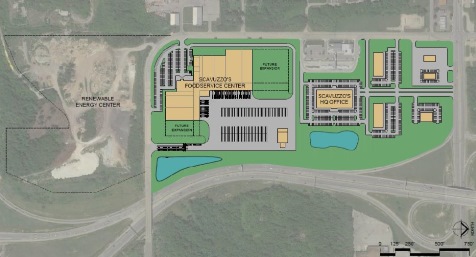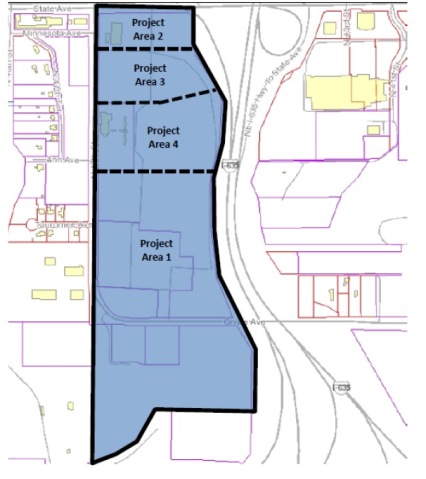

A development agreement that calls for a $1.05 million sale of the former Indian Springs site unanimously advanced at Monday night’s Economic Development and Finance Committee meeting.
The development agreement for the KC Foodie Park next will go to the full Unified Government Commission for approval.
Construction for the first phase of the $140 million total project at 47th and State Avenue could start as early as the fourth quarter of 2019, as soon as the commission approves it, according to Richard Scavuzzo, CEO of Scavuzzo’s Food Service, the developer.
“The UG made a commitment to the Legends area and we’ve seen what that commitment has done for the surrounding area to the Legends, and it just keeps on spreading,” Scavuzzo said at the Sept. 9 meeting. “Now let’s light the fuse on the east side. I think that this is a project that has all the things that is needed to light that fuse, and to start revitalizing from that end of State.”
Scavuzzo’s is a family business that supplies food and restaurant items to customers, including many restaurants. It has been located in Kansas City, Missouri, and Kansas City, Kansas, and through the past hundred years has had five generations of the Scavuzzo family involved in it, he said. The business is owned by his mother, Pam Scavuzzo, who was born in Kansas City, Kansas.
Most of its clients are in the Greater Kansas City area and are mostly independently and locally owned, he said. The company now has expanded to 14 states and also supplies food to a large number of casinos.
Scavuzzo said at the Sept. 9 meeting that the new development agreement is a better collaboration of what the site should have on it, after working with the UG and hearing public comments.
Katherine Carttar, UG economic development director, said the development proposal had changed since the committee originally heard it in July.
At the committee’s request, Scavuzzo’s and the UG went back and negotiated a price for the land at Indian Springs, after objections were raised by committee members to almost giving it away.
The land price would be paid according to phases of the project. The agreement calls for the UG to give the property for the first phase to the developer, and the developer would pay $350,000 each for the land in the second, third and fourth phase. Those funds would be paid at the time the developer begins the phase, according to officials.
The project has a seven-year buildout time for all four phases. The first phase would be started this year, after approval by the commission.
The first phase will be a distribution center and a solar field, according to Scavuzzo. The state-of-the-art distribution facility will use new technology that hasn’t been used previously in the food service distribution industry, he said. It will be an almost fully automated facility, using automated pick technology, he said.
The second phase is the retail and restaurant sites along State Avenue, he said. This group also could include a convenience store, he added. The restaurants and retailers will be locally and independently owned, he said. With the site near the intersection of I-635 and I-70, they are hoping to attract customers who are driving on I-635 or I-70. Scavuzzo said they would start marketing these sites as soon as the board approves the project.
The third phase could include more restaurants, possibly a small format grocery, possibly a hotel and service-related businesses such as meal preparation partners, he said. The timeline is to build the third phase within the first two years of closing the first phase, he said.
The fourth phase is Scavuzzo’s future office headquarters. The first level is planned to be a state-of-the-art test kitchen, which would have culinary programs involving students, he said. While a lot of time has been built into the fourth phase, their intent is to build it within three years after the start of construction of the first phase, he said.
Scavuzzo said some of the benefits to the community from this development would be activating a highly visible gateway site; providing restaurants and retail shops to the neighborhood; and igniting State Avenue redevelopment.
He said the goal is for very visible locally owned restaurants to pull customers in from miles around, instead of just from nearby neighborhoods.
Scavuzzo said the construction of the first phase could bring $40 million to the local participants.
He said he anticipated creating around 30 new jobs the first year and another 70 new jobs over the first five years. About 68 jobs would be relocated initially from the company’s current location in Kansas City, Kansas. These are jobs for Scavuzzo’s and do not include the jobs that might be created in retail establishments and restaurants, or the construction jobs to build the facility.
Because of the technology skills needed in the new facility, the average pay would be around $30 an hour for the jobs that are being created, he said. Scavuzzo said the company started an after-school work program with Wyandotte High School a year ago, and wants to do more of that in the future.
The project would include a home rule sales tax rebate and sales tax industrial revenue bonds at a maximum of $20 million.
Scavuzzo said the development is expected to pay about $6.7 million to the UG in sales tax from 2022 to 2042, $1.3 million annually in property tax during the term of the TIF and $1.2 million annually in property tax after about 20 years.
Employees and customers of the retail stores and restaurants also could use the transit hub that is already in existence at 47th and State.
“This has been a very interesting project to work on. I’ve never worked on anything that has had the so much government involved and citizens involved, and the process has been enlightening,” Scavuzzo said. He added he was proud of the plan put together, and he was ready to move forward.
Carttar said this project hits many goals of the UG, including about 140 jobs in the center of the city, on the bus line, as well as a business that has been renting in Kansas City, Kansas, a number of years wanted to build a substantial investment in the community.
She said the project includes tax-increment financing providing incremental real property taxes from the TIF District on a pay-as-you-go basis, not UG-backed bonds. Only TIF eligible expenses would be included, such as site work and infrastructure. Financing would be capped on each phase and tied to delivery of specific minimum improvements.
The project also has a community improvement district, she said. The agreement would allow the creation of a CID sales tax of 1 percent on retail sales with proceeds being used for pay-as-you-go financing on items such as site work, infrastructure improvements and other construction costs for retail.
The project also has a sales tax exemption through industrial revenue bonds for the construction materials for the food service center, she said.
The home rule sales tax rebate will allow the developer to recover eligible costs to be paid through the UG’s portion of the sales tax generated by the project, with a cap in place, she said.
About two-thirds of the sales tax would go to the UG and about one-third to Scavuzzo’s to be used for construction expenses. The $6.7 million in sales tax and $1.3 million annually in property tax is money that the UG is not currently receiving now, she said.
The maximum amount of public assistance available in this deal is about $34.7 million over 20 years, she said. No more than 25 percent of the project can have public funds, she added.
The project includes only future development tax dollars; there are no general fund dollars or UG-backed bonds involved, she said.
The UG will retain ownership of the land in the project phases until the phase is started by the developer, Scavuzzo said in answer to a question by Commissioner Brian McKiernan.
“I’m pretty excited to have a KCK company that wants to stay and probably double in size bring a $140 million development back to the community where you’ve been for almost 100 years,” Commissioner Melissa Bynum said. “Double the number of jobs that you currently have. And while I’m really happy about the new production and distribution facility, as well as your potential new world food headquarters, those are fabulous, I’m equally excited about the retail and service that you might bring, obviously, to the State Avenue area. I’m also really excited about the solar piece and the technology you were speaking of.”
Both the solar energy and technology in the new center would make this the first in the food service distribution industry, according to Scavuzzo. He said the goal is to be a zero consumption facility, producing as much energy as it consumes. They are slated for a Gold LEED standard currently, he said.
“The technology inside the distribution center is state-of-the-art,” he said.
Jeff Bryant, a Board of Public Utilities member who also serves on the UG Economic Development and Finance Committee, said it’s very significant for Wyandotte County because of its location. He said travelers on I-635 may stop at the restaurants at the location, and there could be lodging there, as well.
He said the maximum public assistance from the UG for the project, $34.7 million, over 20 years, would have an $8 million return. With $1.2 million annually, it would be 22 more years to return that $34 million, he said.
Carttar said fairly conservative numbers were used for the sales tax, and there is the potential for it to be higher.
Bryant said he appreciated the UG and Scavuzzo’s going back to the drawing board and redoing the agreement.
“Thank you very much for staying with our city and thank you for bringing a much more pleasing agreement,” Bryant said.
Commissioner Tom Burroughs said it was refreshing to hear that out of all this work came a result that Scavuzzo called “enlightening.”
He thanked Scavuzzo for taking a piece of property that was expensive for the UG to maintain, the solar field to the south of Indian Springs that is undermined, and putting an infrastructure on top of it to meet an energy-efficient need in industry.
“I commend you for doing that. I would hope that is a shining example of what could be utilized on property around our community that is a burden to us much of the time when we can’t find a use for it,” Burroughs said.
If approved by the full commission, they could be breaking ground within 60 days, Burroughs said.
Greg Kindle, president of the Wyandotte Economic Development Council, said this is a project that has been in the works for a long time.
“This is probably one of the largest expansion projects that we have worked on,” Kindle said, “and one that is in a very challenging location. We are very appreciative to the Scavuzzos, Rich and family, for choosing to stay in Wyandotte County. It’s a highly competitive market. Where they’re looking to go changes the chapter of this location in the community, but also changes the chapter for the company.”
He said this will sit in the center of the community, and there are about 36 other food services companies in Wyandotte County. It will have a good effect when trying to attract other food service companies to the community, he noted.
“We’re excited about the work force component,” he said. “We spend a lot of time trying to connect Wyandotte Countians to the good-paying jobs. These aren’t just jobs, but well-paying jobs.”
Commissioner Jane Philbrook, whose district includes the proposed development area, said, “The Scavuzzo family came along at the right time, and we’re blessed to have them stick with us to make this work for our community.”
For more information, the video of this meeting is online at https://www.youtube.com/watch?v=eBTzeH7YfcI.
